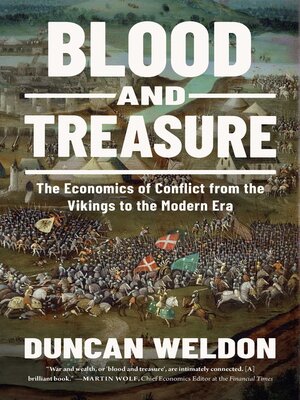Blood and Treasure
ebook ∣ The Economics of Conflict from the Vikings to the Modern Era
By Duncan Weldon

Sign up to save your library
With an OverDrive account, you can save your favorite libraries for at-a-glance information about availability. Find out more about OverDrive accounts.
Find this title in Libby, the library reading app by OverDrive.



Search for a digital library with this title
Title found at these libraries:
| Library Name | Distance |
|---|---|
| Loading... |
A history of the economics of warfare from the Viking Age to our current era, revealing how armed conflict has influenced world power.
Wars are expensive, both in human terms and monetary ones. But while warfare might be costly it has also, at times, been an important driver of economic change and progress. Over the long span of history nothing has shaped human institutions—and thus the process of economic development—as much as war and violence. Wars made states and states made wars. As the costs of warfighting grew so did state structures, taxation systems and national markets for debt. And as warfare became ever more destructive the incentive for governments to resort to it changed too.
Blood and Treasure looks at the history and economics of warfare from the Viking Age to the war in Ukraine, examining how incentives and institutions have changed over the centuries. It surveys how warfare helped drive Europe's rise to global prominence, and it explains how the total wars of the twentieth century required a new type of strategy, one that took economics seriously.
Along the way it asks whether Genghis Khan should be regarded as the father of globalization, explains how New World gold and silver kept Spain poor, ponders why some economists think of witch trials as a form of "non-price competition," notes how pirate captains were pioneers of effective HR techniques, asks if handing out medals hurt the Luftwaffe in World War II and assesses if economic theories helped to create a tragedy in Vietnam.
Underpinning this riveting narrative is a focus on how and why the economics of conflict have changed over time. This is a story of how economics can help to explain the motivations of war, and how understanding the history of warfare can help explain modern economics.
Wars are expensive, both in human terms and monetary ones. But while warfare might be costly it has also, at times, been an important driver of economic change and progress. Over the long span of history nothing has shaped human institutions—and thus the process of economic development—as much as war and violence. Wars made states and states made wars. As the costs of warfighting grew so did state structures, taxation systems and national markets for debt. And as warfare became ever more destructive the incentive for governments to resort to it changed too.
Blood and Treasure looks at the history and economics of warfare from the Viking Age to the war in Ukraine, examining how incentives and institutions have changed over the centuries. It surveys how warfare helped drive Europe's rise to global prominence, and it explains how the total wars of the twentieth century required a new type of strategy, one that took economics seriously.
Along the way it asks whether Genghis Khan should be regarded as the father of globalization, explains how New World gold and silver kept Spain poor, ponders why some economists think of witch trials as a form of "non-price competition," notes how pirate captains were pioneers of effective HR techniques, asks if handing out medals hurt the Luftwaffe in World War II and assesses if economic theories helped to create a tragedy in Vietnam.
Underpinning this riveting narrative is a focus on how and why the economics of conflict have changed over time. This is a story of how economics can help to explain the motivations of war, and how understanding the history of warfare can help explain modern economics.







